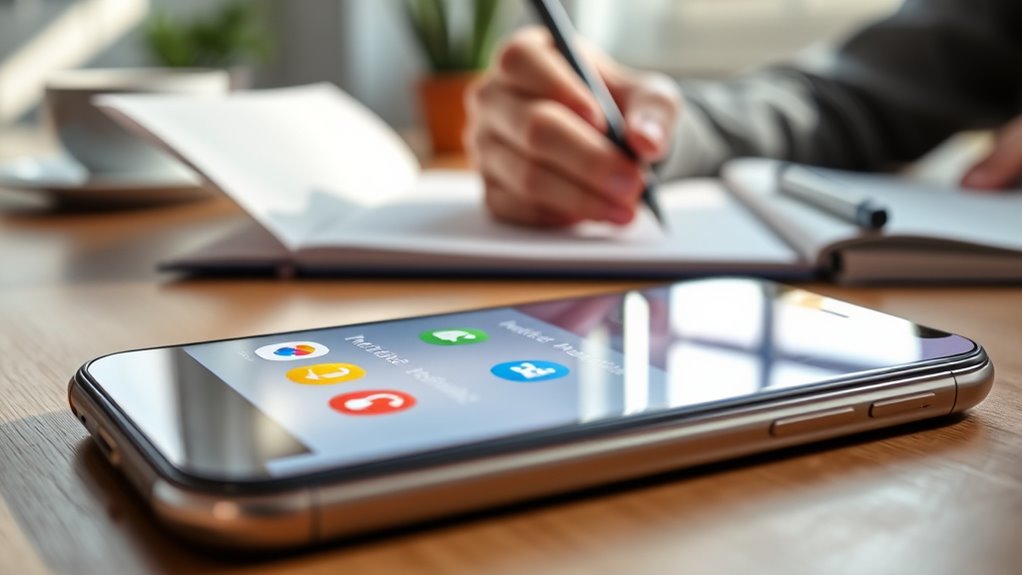Mental health apps offer quick, affordable access to support, with features like guided meditations and mood tracking, making them convenient and private. However, they have limitations, such as lacking scientific backing or personalized care, especially for severe issues. Privacy concerns are also important, as data security varies. While helpful as supplements, they shouldn’t replace professional treatment. Want to learn more about balancing the benefits and risks of digital therapy?
Key Takeaways
- Mental health apps provide quick, private access to support, resources, and self-guided exercises, enhancing convenience.
- They are cost-effective and accessible, especially for underserved populations or those avoiding traditional therapy.
- Apps may lack scientific validation and professional oversight, risking ineffective or harmful guidance.
- They are best used as supplementary tools, not substitutes for professional treatment, especially for severe conditions.
- Privacy and data security concerns require users to evaluate app credibility before sharing sensitive information.

Have you ever wondered how mental health apps are transforming the way we manage stress, anxiety, and depression? These digital tools have become increasingly popular because they offer immediate access to support and resources right at your fingertips. Unlike traditional therapy, which often involves scheduling appointments and traveling to clinics, apps provide a sense of convenience and privacy that appeals to many. With a few taps, you can access guided meditations, mood trackers, cognitive behavioral therapy exercises, and even connect with licensed professionals. This immediacy can help you feel more in control of your mental health and reduce feelings of helplessness during tough times.
However, while mental health apps have many advantages, they also come with limitations. One of the biggest benefits is affordability. Many apps are free or cost considerably less than in-person therapy sessions, making mental health care more accessible for people who might otherwise avoid seeking help due to financial constraints. Additionally, the anonymity and privacy offered by these apps can encourage you to open up about sensitive issues without fear of judgment. For busy individuals, apps fit seamlessly into daily routines, allowing you to engage in mental health practices whenever and wherever you need them.
But it’s important to recognize the drawbacks. Not all apps are created equally, and some may lack the scientific backing or credentials necessary to provide effective support. If an app doesn’t have reputable evidence or qualified professionals behind it, there’s a risk that you might receive guidance that’s unhelpful or even harmful. Moreover, mental health apps often rely on self-guided exercises, which may not be suitable for everyone, especially those with severe depression or anxiety that requires personalized, in-depth treatment. Relying solely on an app might lead you to feel isolated or misunderstood if your needs surpass what digital tools can offer.
It’s also worth considering that apps can sometimes create a false sense of security. You might think that using an app is enough when, in reality, complex mental health issues often require ongoing, professional intervention. Technology can be a valuable supplement, but it shouldn’t replace traditional therapy or medication when those are necessary. Lastly, privacy concerns remain a valid issue; not all apps have the same standards of data security, and your personal information could be vulnerable to breaches.
In the end, mental health apps can be powerful tools if used wisely. They’re most effective when integrated into a broader treatment plan, complemented by professional support when needed. Being aware of their limitations ensures you don’t rely on them as a sole solution but view them as part of a well-rounded approach to managing your mental well-being. Additionally, understanding the importance of Relationship Skills can enhance the effectiveness of digital therapy by fostering healthier interpersonal connections.
Frequently Asked Questions
Are Mental Health Apps Suitable for Severe Mental Health Conditions?
Mental health apps aren’t typically suitable for severe mental health conditions, as they can’t replace professional care. If you’re dealing with intense depression, bipolar disorder, or psychosis, you should seek help from a licensed mental health provider. Apps can supplement treatment or offer support between sessions, but they shouldn’t be your primary resource for serious issues. Always consult a professional to determine the best course for your specific needs.
How Do Privacy Policies Vary Across Different Mental Health Apps?
Think of privacy policies like a fortress guarding your secrets. They vary widely across mental health apps, with some offering robust encryption and transparent data use, while others may share your info with third parties. Always read the policies carefully, assess how your data is stored and used, and choose apps that prioritize your privacy. Protecting your mental health shouldn’t come at the expense of your personal information.
Can Mental Health Apps Replace Traditional Therapy Entirely?
Mental health apps can’t fully replace traditional therapy because they lack personalized, in-depth human interaction. While apps offer convenience and immediate support, they often miss the nuanced understanding a therapist provides. You might find apps helpful for supplemental help or managing mild issues, but for complex or severe mental health concerns, in-person therapy remains essential. Relying solely on apps could leave underlying problems unaddressed.
What Are the Costs Associated With Premium Mental Health App Features?
Premium mental health app features typically cost between $5 and $20 per month, depending on the app and the services offered. Some apps charge a one-time fee for lifetime access. You might also encounter higher costs for personalized coaching or therapy sessions. Be sure to check the app’s pricing structure and what’s included. While these costs can add up, they often provide access to more extensive support and tools.
How Effective Are Mental Health Apps Compared to In-Person Therapy?
You might find mental health apps somewhat effective, especially for ongoing support or managing mild symptoms. However, they typically can’t replace the depth of in-person therapy, where a therapist provides personalized insights and immediate feedback. For serious issues like trauma or severe depression, in-person therapy often offers more extensive care. Ultimately, your effectiveness depends on your needs, commitment, and the app’s quality, but combining both methods can be beneficial.
Conclusion
Just as Icarus soared toward the sun, embracing the promise of the skies, you might find mental health apps tempting as a quick fix. But remember, even Daedalus’s wings needed craftsmanship and caution. While these apps offer accessible support, they can’t replace the nuanced care of a skilled therapist. Use them wisely, as tools in your journey—not as the destination. Balance technology’s promise with human connection, and your mental health will truly take flight.










